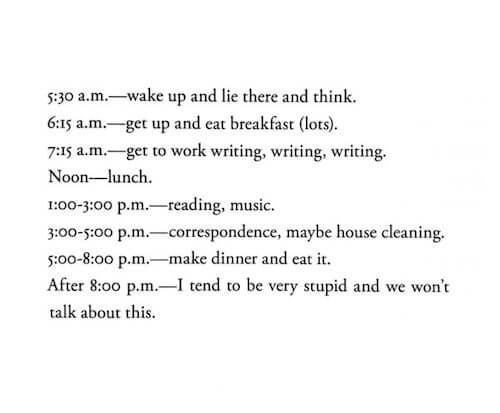
Today some thoughts on when to work less, when to work more, inspired first by Ursula Le Guin, and then by a conversation among parents of adult children early in their careers.
I recently wrote about the seminal author and thinker Ursula Le Guin in the context of their influence on our stereotyping of gender and our deep assumptions around that, in: “Using they as your generic pronoun“. Today I come back to their thinking as I share their daily writing schedule. In short, as they document 15+ hours of their daily schedule, only 4.75 hours of that is their work of writing. However, one immediately gets the sense that everything around their day is designed such that those 4.75 hours are the most creatively productive they can be.
Yes, I often reflect that working fewer hours can create more value, and this is one more example, as ULG left behind an astonishing body of work, not least because it also included deep thinking and moral leadership that influences so many readers and fellow authors to this day.
However, I imagine that this schedule of ULG was one that evolved over decades, perhaps they got to this point by their 50s and 60s. Oh, and as an aside, so much research now coming forward that people become at their most creatively productive around the age of 60, and that this continues through their 80s. For those thinking of retiring at around 60, please don’t retreat solely into pastimes and recreation. Sure, take a break for a few months, but then please seek to muse on what gifts you have to offer if you can step away from the “grind”.
Now, to counter the “work less”, let’s look at “the grind”.
First, I do see many very senior executives (often my clients are in that position) up in their mid-40s to late 50s and still with huge amounts of business, many deadlines, projects to lead, people to manage. They are still in “the grind” mode. I am typically brought in to support them to elevate their leadership, so at that point in their careers, I encourage them to consciously do less and to “be” more, to take time to think, to slow down, to make both fewer and better decisions and to listen, to communicate better than ever.
Now, to the subject question of “When to work less, when to work more?” and relate that to age and stage of career. Simply put, when you are early in your career, in many cases it is absolutely the right thing to do to work hard, to embrace “the grind”.
Recently I was in conversation with two other parents of adult children in their 20s and we are all pleased our children are embracing working hard and long hours and, in fact, enthused by that. Each of the (nine!) children between the three of us are early in their careers, so by working hard and long hours they are also absorbing knowledge and learning at an accelerated rate.We also thought back to our own careers at that stage (basically throughout 2our 0s and perhaps into mid 30s) and how hard we worked and how much we learned, how far we progressed.
For me, from 20 to 23 I did my three years training to be a Chartered Accountant, feeling then that I learned fare more in that three year apprenticeship than in all my academic studies to that point. I then was given so much opportunity to learn through my work once I moved to Cayman as I turned 24, such that by the age of 30 I was in a senior leadership position with an enormous level of responsibility across multiple businesses. In hindsight a key point came when I was around 35 and had the foresight to start to do less so as to see the big picture more. My value to our businesses began to come more and more from delegating and empowering the day to day to others so that I could do less and observe and see more, so as to see the big picture and make fewer decisions, focussing those on adding strategic value. By 45 I had fully moved out of any such day to day responsibilities and I have spent the last decade and more supporting others with their own leadership development and the impact this can have in developing their business and so supporting others.
As you can see, at times I worked more, and as I progressed in age and career stage I consciously structured my work and life to work less so as to create more.
I offer the encouragement you to consider this both for yourself and your own career journey, and also, as a leader, to seek to understand and empathise with those you lead, considering their age and career stage.
